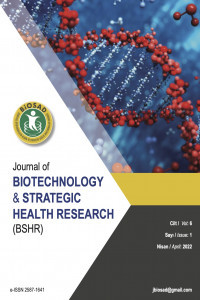YouTube gebelik döneminde covid 19 aşılaması üzerine etkili mi
Is youTube effective on covid-19 vaccination during pregnancy
covid-19 pregnancy, vaccination, , YouTube,
___
- REFERANCES 1. Szmuda T, Rosvall P, Hetzger TV, et al. YouTube as a source of patient information for hydrocephalus: a content-quality and optimization analysis. World neurosurgery. 2020;138:e469-e477.
- 2. Szmuda T, Ali S, Słoniewski P. Letter to the Editor Regarding" A Quality Analysis of Disk Herniation Videos on YouTube". World neurosurgery. 2019;130:570-572.
- 3. Chang W-H. A review of vaccine effects on women in light of the COVID-19 pandemic. Taiwanese Journal of Obstetrics and Gynecology. 2020.
- 4. Heath PT, Le Doare K, Khalil A. Inclusion of pregnant women in COVID-19 vaccine development. The Lancet Infectious Diseases. 2020;20(9):1007-1008.
- 5. Pettirosso E, Giles M, Cole S, et al. COVID‐19 and pregnancy: a review of clinical characteristics, obstetric outcomes and vertical transmission. Australian and New Zealand Journal of Obstetrics and Gynaecology. 2020;60(5):640-659.
- 6. Masarwa R, Levine H, Gorelik E, et al. Prenatal exposure to acetaminophen and risk for attention deficit hyperactivity disorder and autistic spectrum disorder: a systematic review, meta-analysis, and meta-regression analysis of cohort studies. American journal of epidemiology. 2018;187(8):1817-1827.
- 7. Rasmussen SA, Kelley CF, Horton JP, et al. Coronavirus disease 2019 (COVID-19) vaccines and pregnancy: what obstetricians need to know. Obstetrics and gynecology. 2021;137(3):408.
- 8. Graham Jr JM. Update on the gestational effects of maternal hyperthermia. Birth defects research. 2020;112(12):943-952.
- 9. Chan C, Sounderajah V, Daniels E, et al. The Reliability and quality of YouTube videos as a source of public health information regarding COVID-19 vaccination: cross-sectional study. JMIR Public Health and Surveillance. 2021;7(7):e29942.
- 10. Paden CR, Tao Y, Queen K, et al. Rapid, sensitive, full-genome sequencing of severe acute respiratory syndrome coronavirus 2. Emerging infectious diseases. 2020;26(10):2401.
- 11. Shimabukuro TT, Kim SY, Myers TR, et al. Preliminary Findings of mRNA Covid-19 Vaccine Safety in Pregnant Persons. The New England journal of medicine. 2021;384(24):2273-2282.
- 12. Tartof SY, Slezak JM, Fischer H, et al. Effectiveness of mRNA BNT162b2 COVID-19 vaccine up to 6 months in a large integrated health system in the USA: a retrospective cohort study. Lancet (London, England). 2021;398(10309):1407-1416.
- 13. Lagan BM, Sinclair M, Kernohan WG. Internet use in pregnancy informs women's decision making: a web-based survey. Birth (Berkeley, Calif). 2010;37(2):106-115.
- 14. Madathil KC, Rivera-Rodriguez AJ, Greenstein JS, et al. Healthcare information on YouTube: A systematic review. Health informatics journal. 2015;21(3):173-194.
- 15. Yuksel B, Cakmak K. Healthcare information on YouTube: Pregnancy and COVID-19. International journal of gynaecology and obstetrics: the official organ of the International Federation of Gynaecology and Obstetrics. 2020;150(2):189-193.
- 16. Roberts M, Callahan L, O'Leary C. Social Media: A Path to Health Literacy. Studies in health technology and informatics. 2017;240:464-475.
- 17. Moorhead SA, Hazlett DE, Harrison L, et al. A new dimension of health care: systematic review of the uses, benefits, and limitations of social media for health communication. Journal of medical Internet research. 2013;15(4):e85.
- 18. Drozd B, Couvillon E, Suarez A. Medical YouTube Videos and Methods of Evaluation: Literature Review. JMIR medical education. 2018;4(1):e3.
- Yayın Aralığı: Yılda 3 Sayı
- Başlangıç: 2017
- Yayıncı: Deneysel, Biyoteknolojik, Klinik ve Stratejik Sağlık Araştırmaları Derneği
YouTube gebelik döneminde covid 19 aşılaması üzerine etkili mi
Şükran DOĞRU, Fatih AKKUŞ, Aslı ALTINORDU ATCI
COVID-19 pandemisinin dermatoloji polikliniğinde tanı dağılımına etkisi
Nur Cihan COŞANSU, Mahizer YALDIZ, Bahar SEVİMLİ DİKİCİER, Ünal ERKORKMAZ
Laboratuvar parametreleri ve oranlarının COVID-19 enfeksiyonunda prognoz ve mortalite ile ilşkisi
Hasan ERGENÇ, Zeynep ERTÜRK, İbrahim Hakkı TÖR, Songül ARAÇ, Mustafa USANMAZ, Cengiz KARACAER, Gülsüm KAYA
İlknur BIYIK, Yeliz TANRIVERDİ ÇAYCI, Ege Berke ATIGAN, Asuman BIRINCI
VERTEBRAL OSTEOMYELİT KONULU YAYINLARIN BİBLİYOMETRİK ANALİZ YÖNTEMİ İLE İNCELENMESİ
Türkiye'de COVID-19 aşı tereddütünün YouTube analiz yöntemi ile araştırılması
Sevil ALKAN, Bülent AKKAYA, Hatice ÖNTÜRK AKYÜZ
COVID-19 Enfeksiyonu Sonrası Gelişen Telogen Effluvium: Vaka Sunumu
Erkut ETÇİOĞLU, Muhammet Raşit AYDIN
Muhammet SEVİNDİK, Şerif Bora NAZLI, Orhan Murat KOÇAK
SARS-CoV-2 Enfeksiyonu ve Karaciğer tutulumu
